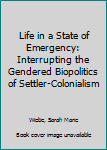Life in a State of Emergency: Interrupting the Gendered Biopolitics of Settler-Colonialism
Chief Theresa Spence spawned a flurry of attention and controversy for placing her body at the forefront of settler-colonial relations in Canada in 2012, beginning a hunger strike that caused physical, mental and emotional duress. This book applies a biopolitical lens to examine the political engagement between the Canadian State and Chief Theresa Spence's community during her high-profile hunger strike. Through discourse analysis, this book evaluates and unearths the predominant narratives representing Chief Spence, her body and her community while bringing into focus the voices and stories from community-members themselves. This book contributes to the study of biopolitics and geopolitics in three core ways: First, it presents a multi-layered account of the historical, legal, political, environmental and social conditions shaping everyday life in Attawapiskat, the community reserve's lands. Second, using feminist discourse analysis, this book evaluates official responses to and representations of Chief Theresa Spence's hunger strike. Third, to interrupt these discourses with situated stories, this book grounds discourse analysis within arts-based participatory action research. Contributing to debates at the intersection of biopolitics, geopolitics, environmental justice and Settler-Colonial studies, this work seeks to cultivate dialogue about decolonization in Attawapiskat, Canada and the world.
Format:Hardcover
Language:English
ISBN:1786601826
ISBN13:9781786601827
Release Date:March 2050
Publisher:Rowman & Littlefield International
Length:256 Pages
Grade Range:Postsecondary
Customer Reviews
0 rating





